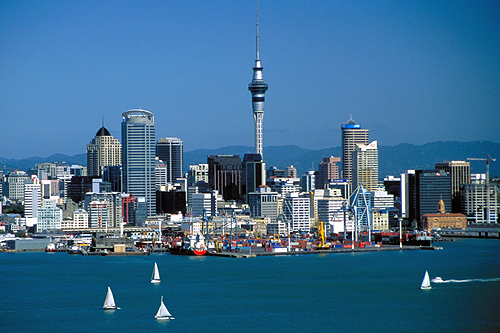1

1. Vienna is Austria’s largest by population, as well as the cultural, economic, and political center of the nation. Vienna’s ability to transform old infrastructure into modern dwellings won the city the 2010 UN urban planning award for improving the living conditions of its residents. Under a multimillion-dollar program, the city refurbished more than 5,000 buildings with nearly 250,000 apartments. Vienna is also the world’s number one destination for conferences, drawing five million tourists a year — equivalent to three tourists for every city resident.
Countries such as Austria, Germany, and Switzerland have fared quite well in the quality of life rankings, despite recent turmoil in Europe. However, Mercer’s senior researcher Slagin Parakatil says these cities are not immune to decreases in living standards if the region’s economic troubles continue to go unsolved.
2

2. Zurich is known as the economic engine of Switzerland, with one out of every nine jobs in the country based there. Its low tax rates attract overseas companies to set up headquarters, while the assets of the 82 banks based there are equivalent to more than 85 percent of the total value of all assets held in Switzerland. The city is also the country’s biggest tourist destination, famous for its lakeside location and chain of hills that run from north to south, providing an extensive range of leisure activities.
Zurich is Europe’s third most expensive city, according to Mercer’s cost of living survey. Its finance sector generates nearly a third of its wealth and about quarter of its jobs. The city’s housing market has become a source of tension in recent years, however, with a shortage of apartments driving up living costs.
3

3. Auckland has the best quality of life in the Asia-Pacific region. It has consistently placed within the top five best places to live in the last five years.
As New Zealand’s largest city, Auckland’s 1.35 million people account for more than 30 percent of the country’s population. About 63 percent of its residents are of European descent, while Moaris (native to New Zealand), and people of Pacific Islands descent make up 24 percent. The city is uniquely set between two harbors, with 11 extinct volcanoes and numerous islands making it the city with the world’s largest boat ownership per capita. Auckland is also ranked as the second safest city in the Asian region, behind Singapore.
4

4. Munich is Germany’s third largest city and one of the country’s key economic centers.
As home to some of Germany’s most notable businesses, including engineering firm Siemens and insurer Allianz, the city generates about 30 percent of the GDP of the State of Bavaria. The city’s purchasing power per capita was more than $33,700 in 2009, the highest among all German cities and 32 percent above the national average. Drawing immigrants to its industries from all over the world, more than 40 percent of the city’s residents are foreigners.
Despite having a prosperous economy, Germany is facing a skilled labor shortage with its aging population. Associations estimate that 80,000 engineering jobs need to filled annually, along with 12,000 doctors and 66,000 IT specialists. Over the past few months, the country’s government has turned to debt-radden countries such as Spain, Portugal, and Greece to find job seekers.
5a

5. Dusseldorf Rhine is the seventh most populated in Germany Nokia Siemens Germany
German cities such as Dusseldorf
5b

5. Vancouver is renowned for making numerous rankings of the world’s most livable city over the past decade. It has ranked among the top five in the Mercer quality of living survey for the last five years. Home to one of the mildest climates in Canada, Vancouver is also its greenest city, with the smallest carbon footprint of any major city in North America. Surrounded by water and snowy mountains, Vancouver’s government constantly promotes green building, planning, and technology, with the ambition of becoming the world’s greenest city by 2020.
Despite being ranked as high as the 17th safest city in the world along with its Canadian counterparts Toronto, Calgary, Montreal, and Ottawa, Vancouver made headlines this past year for violent riots. Graphic images were shown around the world in June, after hockey fans went on a rampage following a loss in the Stanley Cup finals.
World's most livable cities 2011: researched by the Economist Intelligence
World's most livable cities 2012: researched by Monocle's
Kyoto (11), Fukuoka (12), Hong Kong (13), Paris (14),Singapore (15), Hamburg (16), Honolulu (17), Berlin (18), Vancouver (19), Madrid (20),Barcelona (21), Portland (22), San Francisco (23), Montréal (24) and Geneva (25).
| |||||||||||||||||||||||||||||||||||||||||||||||||||||||||||||||||||||||||||||||||||||||||||||||
7

7. Frankfurt is one of three German cities to rank among the top 10 in the world.
The city is the fifth largest in Germany and considered the largest financial center in continental Europe. It’s home to major institutions such as the European Central Bank and the Frankfurt Stock Exchange. Frankfurt is also a major transport hub for central Europe given its modern infrastructure, including an integrated high-speed rail network and a busy international airport. About 114 million passenger journeys are made on the city’s subway system annually, while 50 million passengers pass through the airport annually — the ninth highest in volume globally.
Frankfurt is the 11th safest city in the world based on crime levels and law enforcement effectiveness. The city made headlines in September after its government banned local chapters of the Hells Angels and confiscated their assets, citing a history of drugs, weapons offences, and violence.
沒有留言:
張貼留言